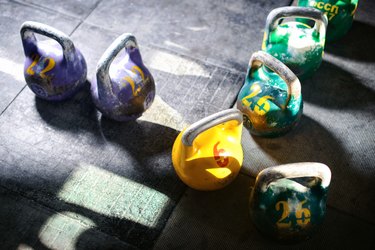
If you're wondering how to lose 5 pounds in a week, take note: Rapid weight loss is not recommended by any health professional — in fact, it can potentially cause health problems or weight regain.
If weight loss is your goal — whether or not you want to lose 5 pounds in a week — it's instead recommended to slim down at a safe and sustainable pace of 1 to 2 pounds per week, according to the Mayo Clinic.
Video of the Day
Video of the Day
Here are tips to help you lose weight without compromising your nutrition or overall wellbeing.
Understanding Weight Loss
There are three main components to successful weight loss, and two of them involve paying attention to the quality of the calories which make up your meal plan, according to the International Sports Sciences Association (ISSA).
Per the ISSA, doing these three things will help you burn fat more efficiently:
- Cut out (or cut down on) the amount of starchy carbohydrates you eat.
- Increase the amount of lean protein you take in.
- Increase the both the intensity and duration of your workouts.
But remember: While following this advice for how to lose 5 pounds in a week may help you melt off a little bit of fat, most of it will be water weight. What's more, weight loss this extreme is neither safe nor feasible.
In fact, losing weight this quickly can burn through muscle rather than fat, deplete nutrients and may not be sustainable in the long run, according to the Mayo Clinic. Instead, aim to lose weight at that safer rate of 1 to 2 pounds per week.
Tip
Talk to your doctor before trying any weight-loss program to make sure it's safe for you, according to the Mayo Clinic.
How Many Calories Should I Eat This Week?
How many calories you should eat every day depends on factors like your age, size, sex and activity level. But in general, cutting 500 to 1,000 calories per day (through eating less and/or moving more) will help you lose weight at the safe pace of 1 to 2 pounds per week, according to the Mayo Clinic.
However, calorie intake should not fall below 1,200 per day for people assigned female at birth or 1,500 per day for people assigned male at birth (unless under doctor supervision), because eating too few calories can deprive you of nutrients, per Harvard Health Publishing.
Don’t Skip Meals
While reducing your calorie intake is an important component of any weight-loss program, that does not mean you should cut out entire meals.
Skipping meals can prompt your body to lower its metabolism and burn less calories in order to conserve energy, per the University of Louisville. It can also lead to eating more high-calorie, processed foods later to compensate, which may contribute to weight gain.
What's more, skimping on meals can cause symptoms like headaches, fatigue and shakiness, according to the University of Louisville.
Tip
Eating every 4 to 6 hours can help keep your energy levels stable (though the best time frame for you may vary based on your health needs and activity level), per the University of Louisville.
Cut Out Starchy Carbs
If those 5 pounds sneaked up on you all at once, the culprit could be water weight, according to Texas A&M University.
Water is necessary for your body to function at its best, but certain circumstances can cause you to retain more water than your body can use, including:
- Too much sodium in your diet
- Too many carbs in your diet
- Hormones
- Underlying medical conditions
If you find you're retaining more water than usual, talk to your doctor to see if there's an underlying condition to blame, according to Texas A&M University.
On that note, just as some people have an intolerance for gluten or lactose, so too can the body be intolerant of carbohydrates, per Ohio State University's Wexner Medical Center.
If you have a carbohydrate intolerance, your body can't metabolize carbs efficiently. Extra carbs encourage your pancreas to send insulin into your bloodstream, and if there are any carbs left, your liver takes them in and stores them as fat.
Per Wexner Medical Center, carbs to avoid include:
- Refined sugar
- White flour
- Simple grains like white rice
- Fruit juice
- Soda
- Chips, crackers and pretzels
- Baked goods like cake, cookies, donuts
Pile on the Protein
One way to achieve quicker weight loss is to eat more lean protein, according to the Massachusetts Institute of Technology (MIT).
Protein is harder than carbohydrates for your body to digest, so it can keep you feeling full for longer after a meal. Eating a diet that is high in protein also keeps you from losing muscle mass, because your body burns fat instead, per MIT.
A high-protein diet can also help older adults burn fat without losing bone density, according to Wake Forest University. This is important because you do not want to risk causing any damage to your body.
Try adding these lean protein sources to your diet:
- Baked, broiled, grilled or roast chicken
- Fish
- Soy products like tofu or tempeh
- Legumes like lentils and beans
- Nuts
Load Up on Leafy Greens
Can you lose 5 pounds in a week? While it may be possible, that doesn't mean you should do it — it's safest to stick to the expert-recommended pace of 1 to 2 pounds of weight loss per week, per the Mayo Clinic.
One way to help you achieve your weight-loss goal is to load your meal plans with fresh, crisp leafy greens and cruciferous vegetables, according to Grand Canyon University (GCU).
Here are some leafy greens to add to your diet:
- Lettuce
- Spinach
- Kale
- Arugula
- Cruciferous vegetables like broccoli, Brussels sprouts, cabbage and cauliflower
Not only are they packed with nutrients, but leafy green vegetables offer a lot of bulk for very few calories, per GCU. This can help keep you feeling full while keeping total calorie intake low. Fiber also aids in healthy digestion, which may help prevent bloating.
Cruciferous vegetables are also loaded with vitamins, antioxidants and fiber, per GCU, ensuring that your low-calorie meal plan is as nutritious as possible.
Keep a Food Journal
Recording what you eat may help keep your diet on track, regardless of whether your goal is to lose 5 pounds in one week. For instance, it can help you identify high-calorie foods you turn to in times of stress so you can steer clear of these snacks, per the Mayo Clinic.
You can also journal about your mood and behaviors to see how they correlate to your eating habits, which will allow you to better address triggers, according to the Mayo Clinic.
Work Out to Reduce Weight
Exercise is another way to help you lose weight faster, according to Concordia University-Saint Paul. Although activity alone won't guarantee 5 pounds of weight loss, it can certainly help.
Exercising not only helps you to lose weight, but also supports lung health, lowers blood pressure, burns of belly fat and releases endorphins to help elevate and regulate your mood, according to Cornell University.
While exercising may not have a huge effect on your one-week weight-loss plan, doing both cardio and weight workouts for a full week may help you get into the habit of exercising regularly, which benefit you in the long run.
Types of Cardiovascular Exercises
Cardiovascular exercise can raise your heart rate and burn calories, according to Concordia University. Here are some cardio activities to try:
- Running
- Walking
- Swimming
- Dancing
- Playing a high-intensity sport like tennis or racquetball
Types of Strength Training Exercises
Strength and weight training can also contribute to calorie burn. Here are different types of strength training to consider:
- Bodyweight exercises
- Resistance band exercises
- Suspension exercises
- Dumbbell, kettlebell or barbell workouts
- Strength training machines
- Powerlifting
- Bodybuilding
Help Your Body Hydrate
Another component to your weight loss week is one that many people tend to overlook: Staying hydrated.
In fact, people who have obesity are more likely to be improperly hydrated (while those without obesity are more likely to be more hydrated), according to a July 2016 study in the Annals of Family Medicine.
This may be due to habits like eating fewer water-rich fruits and vegetables or not drinking enough water throughout the day.
While the link between hydration and weight loss needs to be studied more closely in order to draw clear conclusions, the study does note that staying hydrated can help with weight loss.
For instance, people may mistake thirst for hunger and take in more calories than needed, which in turn can sabotage even a short-term, one-week-only weight-loss plan.
How Much Water Should You Drink?
Use this equation to determine how much water you should drink every day:
Body weight (in pounds) ÷ 2 = minimum ounces of water you should drink per day.
Manage Stress
Stress and weight gain are linked because stress can prompt behaviors like eating more than usual, snacking on more high-calorie or processed foods and skipping exercise, according to the Mayo Clinic.
That's why taking measures to prevent or alleviate stress may help you with weight management. According to the Mayo Clinic, here are some tips to help improve your mental wellbeing:
- Eat a balanced diet
- Don't skip meals
- Exercise regularly
- Find a therapist to work with to learn how to cope with hard times
- Try relaxation techniques like yoga, stretching, massage, deep breathing and meditation
- Connect with loved ones
- International Sports Sciences Association: "3 Science-Backed Methods for Losing Fat"
- Texas A&M University: "You Asked - 'What Is Water Weight?'"
- Massachusetts Institute of Technology: "Study Suggests Healthy Weight Loss Is More Than Just Math"
- Grand Canyon University: "Fitness Facts - Friendly Foods for Weight Loss"
- Cornell University: "Exercise for Weight Loss?"
- University of Concordia-Saint Paul: "The Science of Weight Loss"
- Annals of Family Medicine: "Inadequate Hydration, BMI, and Obesity Among US Adults: NHANES 2009–2012"
- Wake Forest University: "New Study Shows More Protein and Fewer Calories Help Older People Lose Weight Safely"
- University of Louisville: "Perils of Skipping Meals"
- Harvard Health Publishing: "Calorie counting made easy"
- Mayo Clinic: "Counting calories: Get back to weight-loss basics"
- Mayo Clinic: "Weight loss: Choosing a diet that's right for you"
- Mayo Clinic: "Why do doctors recommend a slow rate of weight loss? What's wrong with fast weight loss?"
- Wexner Medical Center: "A carb intolerance may be the reason weight loss is difficult"
- Mayo Clinic: "How do I control stress-induced weight gain?"



